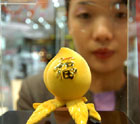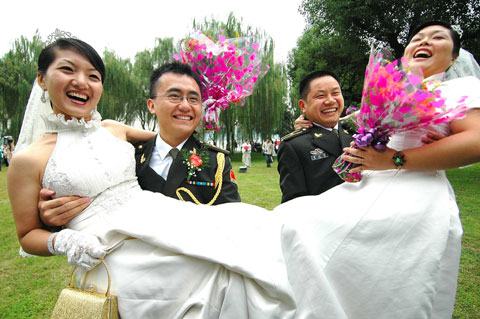Deng spent a year at the Sun Yat-sen University, reading books and studying the basic theories of Marxism-Leninism. At this time Feng Yuexiang ,commander of the National Army in northwest China, arrived in the Soviet Union. He was preparing to join in the national revolution in China, so he asked the Communist International to send a number of its Chinese comrades to work in his army. Deng was one of the score of people selected. Traversing the deserts of Mongolia, he arrived in his homeland in the spring of 1927.
After six ears abroad, Deng Xiaoping was no longer the naive young man he had been before he left China. He was now a staunch revolutionary with a basic understanding of Marxism-Leninism and some experience of practical struggle.
THE EARLY YEARS AFTER THE RETURN
Deng returned on the eve of the breakdown of co-operation between the Kuomintang and the Communist Party, and the political situation was unstable. It was under these circumstances that in March 1927 he accepted the Party's assignment to go to Xi'an and work at the Sun-Yat-sen Military and political Academy. This was the first place where he carried out revolutionary activities in China. The Academy was officially under the general headquarters of Feng Yuxiang's National United Army; actually, however, it had been established by Liu Bojian and several other Communists. Deng Xiaoping served as Chief of the Political Section. political instructor and Secretary of the Communist Party organization in the Academy. The Academy trained a number of political aware junior officers as well as Party and political cadred. It sent some of its graduated to the Political cadres. It sent some of its graduated to the Political Security Corps of the Shaanxi Command of the National United Army, thus gradually building a Communist-led corps of revolutionaries within the army and laying the foundation for the communist-led uprising that took place in Weinan and Huaxian in Shaanxi in April and May 1928. Some future generals of the Northern Shaanxi Red Army were also graduated of the Academy.
In April 1927 an abrupt change occurred in China's political situation. In June Feng Yexiang ordered all the Communists in his army to assemble in Kaifeng in neighboring Henan Province to receive "training". Actually, this was only a pretext to get rid of them. Acting on Party instructions. Deng Xiaoping left Xi'an for Hankou in Hubei Province, where the Central Committee of the Chinese Communist party was located.
In Hankou he worked as a secretary for the central Committee. In the meantime, the political situation continued to deteriorate. Before long the Kuomintang government in Wuhan was openly attacking the Communist party. A grim reign of White terror descended on the country, forcing the Communist Party underground. It was at this time that Deng Xixian changed his name to Deng Xiaoping. On August 7 the Central Committee held an emergency meeting as a non-voting delegate. After the Central Committee secretly moved to Shanghai, the 23-year-old Deng was appointed chief secretary of the Central Committee, in charge of the general headquarters' documents, confidential work, communications and financial affairs. In June 1928, when the Party held its Sixth Congress in Moscow, he stayed behind to help Li Weihan and Ren Bishi, who had been left in charge of day-to-day affairs at headquarters.
BUILDING THE SEVENTH AND EIGHTH ARMIES OF THE RED ARMY
After Chiang Kai-shek and Wang Jingwei staged successive counter-revolutionary soups, the once-dynamic Great Revolution ended in failure. To save the revolution, the Communist Party launched a series of armed uprisings against the reactionary Kuomintang regime. In the summer of 1929 Li Mingrui and Yu Zuobo, who had just taken control of military and political power in Guangxi to direct the work of the local Party organizations and prepare for an armed uprising. This was the first time that Deng was independently undertaking the important responsibility of leading a region.
In Nanning Deng Xiaoping made contact with Yu Zuobo and Li Minrui under the alias of Deng Bin and began building revolutionary forces. In October Yu and Li's campaign against Chiang was defeated. Deng and Zhang Yunyi pulled the three Communist-controlled detachments out Nanning and led them to the Zuojiang and Youjiang areas. By the end of the month Deng was appointed Secretary of the Guangxi Front-line Committee of the Chinese Community Party.In December, together with Zhang Yunyi and Wei Baqun, he launched the Bose Uprising, founding the Youjiang Soviet Government and the Seventh Army of the Chinese Workers' and Peasants' Red Army and Secretary of its Front-line Committee. In February of the following year, along with Li Mingrui and Yu Zuoyu, he launched the Longzhou Uprising , creating the Zuojiang Soviet Government and the Eighth Army and serving as its Political Commissar. In the same month Deng returned secretly to Shanghai to report to the Central Committee. The Committee officially appointed Li Mingrui General Commander of both the Seventh and Eighth Armies and Deng Xiaoping their Political Commissar. In the Youjiang area they mobilized the masses to expropriate local tyrants, distribute land, carry out agrarian revolution and establish revolutionary governments at various levels. As a result, the local Red Army forces were expended to cover some 29 countries with a population totaling more than one million. thus the Youjiang area became one of the largest revolutionary bases.
At this time, however, the leaders of the Central Committee made some "Left" errors. In October 1930 a representative of the Committee came to Guangxi to push the Li Lisan line, asserting that a nationwide revolutionary high tide had set in. He accordingly ordered the Seventh Army (with which the Eighth Army had already been merged, after suffering military setbacks) to leave the base area immediately and to fight its way to Liuzhou, Guiling and Guangzhou. Deng Xiaoping doubted the possibility of taking these cities and expressed his disagreement. nevertheless, most of his comrades maintained that they should obey the representative's instructions, and Deng was therefore obliged to act accordingly. Eventually, owing to repeated defeats and heavy losses, the Army had to give up the plan of attacking the big cities.
After the representative of the Central Committee left, the Army, now reduced to less than ,000 men, was reorganized. The Front-line Committee decided to move the troops to Jiangxi Province to join the Red Army forces in the Central Revolutionary Base Area there. After the Seventh Army took the seat of Chongyi County in Jiangxi in February 1931, the Front-line Committee sent Deng to Shanghai to report to the Central Committee. In Shanghai he wrote a report in which he described in detail how things stood in the Seventh Army and analyzed the lessons they had learned from their uprisings.











